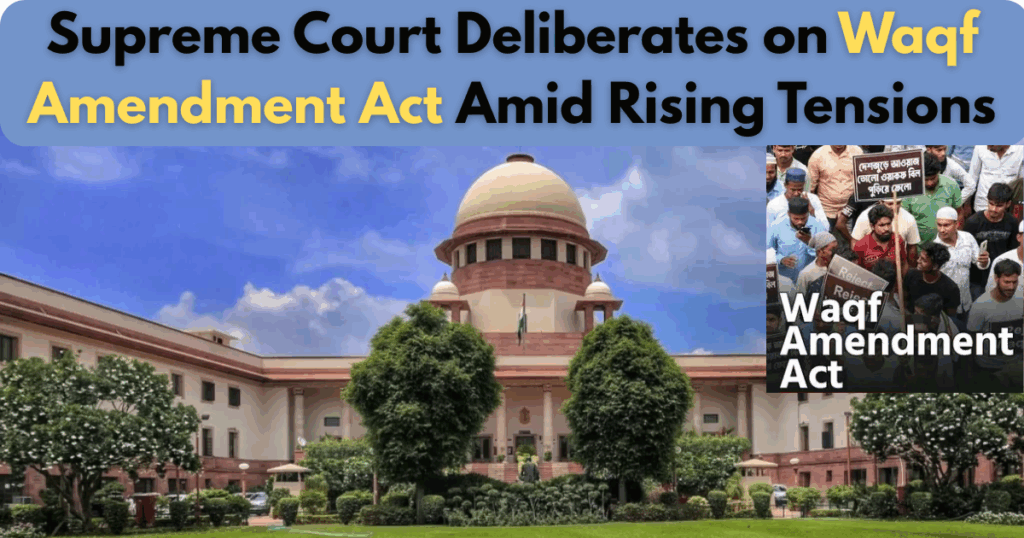Supreme Court Deliberates on Waqf Amendment Act Amid Rising Tensions: Retreating its observation on the presumption of constitutionality in favour of the law, the Supreme Court on Thursday reserved interim orders on three key issues after hearing both sides in the waqf case.
Supreme Court Deliberates on Waqf Amendment Act
The Union Government on Thursday defended the Waqf Act 2025 in the Supreme Court, asserting that the law regulates only the secular and administrative aspects of waqf institutions without interfering with essential religious practices or beliefs of the Islamic faith.

Before reserving the interim order, a bench comprising Chief Justice B. R. Gavai and Justice Augustine George Masih heard senior advocates, including Kapil Sibal, Rajeev Dhavan and Huzefa Ahmadi, for those challenging the amended Waqf law, and Solicitor General Tushar Mehta representing the Centre, on three consecutive days.
What does the Supreme Court say about the Waqf bill?
The Supreme Court on Thursday said a requirement to mandatorily register waqfs dated back to 1923 and did not start with the Waqf Act of 2025. Chief Justice of India B.R.
During the hearing before a bench comprising Chief Justice of India B.R. Gavai and Justice A.G. Masih, the petitioners countered the Centre’s stand that “waqf by user was not an essential practice of Islam, while those favouring the amendments claimed that “waqf by user” had been misused to claim government land, entire villages and even temples which predate Islam.
On the other side, Solicitor General Mehta clarified that the new rule would apply only going forward. “If such properties are already registered, they will continue to be considered Waqf,” he told the court. He also said this assurance had been made in parliament by Union Minister Kiren Rijiju. During earlier hearings on April 16 and 17, the court had heard detailed arguments. Kapil Sibal argued that the omission of the “waqf by user” clause was problematic because many centuries-old religious places like mosques and dargahs do not have formal registration papers but have always been used by the public as waqf properties.
The political Significance of the Waqf Amendment Act
The political implications of the Waqf Amendment Act are profound, especially as the case continues to unfold in the Supreme Court. The law touches upon key aspects of religious and cultural autonomy, which makes it highly sensitive. The provisions of the Act, particularly the inclusion of non-Muslims in Waqf boards, have created a divide not only among the Muslim community but also among political parties.
The opposition parties, including Congress and other Muslim advocacy groups, have criticised the Act, arguing that it infringes upon the autonomy of Muslim institutions. And on the other hand, the ruling party, the Bharatiya Janata Party, has defended the law, claiming that it is designed to improve the functioning of Waqf properties and ensure better governance.
Potential Outcomes and Legal Precedents
As the Supreme Court deliberates on the Waqf Amendment Act, the potential outcomes of the case remain uncertain. However, the court’s approach so far suggests that it may be inclined to issue an interim order to halt the implementation of the two contentious provisions. The Court has also hinted at considering the broader implications of these provisions, particularly in terms of their impact on religious and cultural rights.
If the court rules against the government’s position, it could lead to a significant setback for the Waqf Amendment Act; the potential outcomes of the case remain uncertain. However, the court’s approach so far suggests that it may be inclined to issue an interim order to halt the implementation of two contentious provisions. The Court has also hinted at considering the broader implications of these provisions, particularly in terms of their impact on religious and cultural rights.
The Waqf Amendment Act, 2025,
This is one of the most significant legal developments in recent times, with its provisions stirring debate and controversy across the political spectrum. As the matter now stands before the Supreme Court, the involvement of Solicitor General Tushar Mehta and prominent legal figures from the opposition underscores the importance of this case.
Conclusion
In this article we discussed the Supreme Court deliberates on the Waqf Amendment Act amid rising tensions. The Supreme Court on Thursday reserved its decision on the prayer for interim directions on petitions challenging the constitutional validity of the Waqf Act, 2025.








